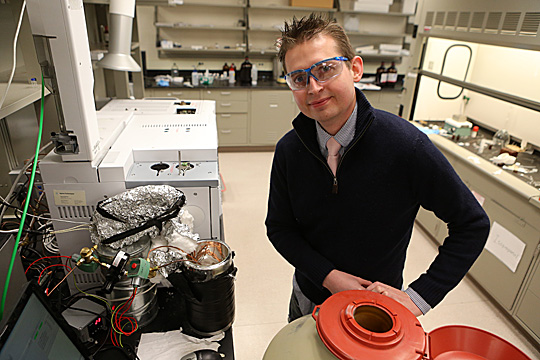A University of Toledo professor of chemistry and biochemistry has been named as one of the most influential people in the field of analytical science.

Dr. Jared Anderson just poured liquid nitrogen into a dewar that is the cryogenic cooling unit for a two-dimensional gas chromatograph. This separation system allows him to obtain profiles of paraffins and aromatic compounds that are components of petrochemical samples, such as kerosene and diesel fuels.
“The fact that we received worldwide recognition for the influence of our work in the field of analytical chemistry is quite gratifying,” Anderson said.
“It is a great honor to be named to that list, and it was only possible because of the teamwork and strong work ethic of my research group over the past nine years since I have been at UT,” Anderson said. “I’ve been able to work with an incredible group of graduate and undergraduate students, and I am extremely lucky and grateful for that.”
Most recently, Anderson has been working on developing sample preparation approaches with applications in the life sciences. Specifically, he is exploring new methods for the analysis of nucleic acids from environmental and biological samples.
“Our work runs the gamut from separating high-boiling petroleum samples using multidimensional chromatography to sample preparation within the biological sciences, predominately in the area of rapid DNA analysis,” Anderson said. “Ultimately, our goal is to create new tools for chemists and biochemists in industry and academia so they can address challenges within chemical separations.”
In 2010, Anderson received $850,000 in both federal and industrial grants; today that figure is more than $1,350,000.
“I am incredibly lucky to receive these grants in order to further my research; it leads to advancements in the field and new opportunities for my research team,” he said.
Anderson and his team also have been working with a company in California to make pharmaceutical drugs safer. Their goal is to create new tools and methods that can be used by analytical chemists all over the world to address current challenges in detecting and removing genotoxic impurities from pharmaceutical drugs.
“The international recognition Jared has received as one of the top analytical chemists worldwide validates our long-standing belief that he is an outstanding and creative scientist. He is also one of the department’s best teachers and mentors for our students,” Dr. Jon Kirchhoff, Distinguished University Professor and chair of Chemistry and Biochemistry, said.